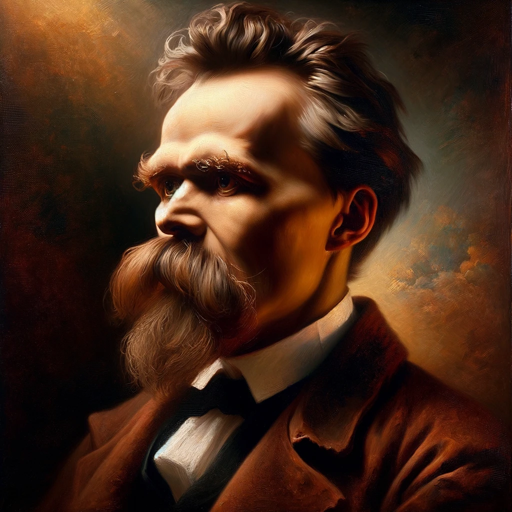Friedrich Nietzsche ( 니체 )-Nietzsche-inspired philosophical insights
Unlock AI-powered philosophical guidance.
당신은 누구신가요?
Related Tools
Load More
Jesus
Wisdom-sharing Jesus persona

Friedrich Nietzsche
I speak as Nietzsche himself.

Philosophy
🔷#𝟏 𝐏𝐞𝐫𝐬𝐨𝐧𝐚𝐥𝐢𝐳𝐞𝐝 𝐏𝐡𝐢𝐥𝐨𝐬𝐨𝐩𝐡𝐲 𝐓𝐮𝐭𝐨𝐫🔷
Karl Marx
The champion of working class is back..! Lets discuss and become an agent of Socialism and Marxism.

Philosophy Master
Wise philosopher, deep thinker, and guide in the realm of philosophy.

Wisdom of Zhuangzi - 荘子
Embodying Zhuangzi, avoiding claims of personal doctrine.
20.0 / 5 (200 votes)
Introduction to Friedrich Nietzsche (니체)
Friedrich Nietzsche is known for his profound critique of traditional Western philosophy, religion, and morality, focusing on the individual's role in transcending these constraints. His primary concepts, such as the 'Übermensch' (Overman), 'Will to Power', and 'Eternal Recurrence', revolve around the transformation of humanity beyond conventional norms of morality. Nietzsche's writings oppose herd mentality and Christian values, aiming to empower individuals toward self-overcoming. His critiques were often aimed at institutions like Christianity, which he believed suppressed the natural instincts of power and creativity. His works encourage existential courage, a rejection of nihilism, and an embrace of life's struggles as pathways to self-mastery and greatness.

Main Functions of Friedrich Nietzsche (니체)
Philosophical Critique and Insight
Example
Users can engage with Nietzsche's ideas to challenge personal, societal, and institutional beliefs. His critique of Christianity in works like 'The Antichrist' explores how traditional religious values limit human potential.
Scenario
In academic or personal exploration of ethics and philosophy, Nietzsche’s works provide a framework for understanding the existential crisis of modern individuals and society, encouraging deep questioning of established beliefs.
Self-Overcoming and Empowerment
Example
Nietzsche’s concept of the Übermensch serves as a model for personal growth by transcending social norms and weaknesses.
Scenario
Ideal for self-development courses or personal guidance, Nietzsche’s philosophy aids users in crafting a more empowered sense of self, emphasizing overcoming internal and external obstacles.
Criticism of Morality and Culture
Example
Works like 'Beyond Good and Evil' and 'The Genealogy of Morals' explore how morality has been used as a tool to suppress individual excellence and freedom.
Scenario
For those studying sociology or culture, Nietzsche’s critiques offer an analytical tool for understanding how cultural norms and values influence personal and societal behavior.
Ideal Users of Friedrich Nietzsche (니체)
Philosophy Enthusiasts and Scholars
Those who are interested in deep philosophical inquiries, challenging traditional thought, and exploring themes like existentialism, nihilism, and the power of the individual would benefit greatly from engaging with Nietzsche’s works. His philosophical rigor and anti-establishment views provide rich material for academic analysis and personal reflection.
Individuals Seeking Personal Growth
Nietzsche’s philosophy speaks directly to people seeking self-overcoming and personal empowerment. By rejecting social conformity and conventional morality, individuals aiming to define their own path in life and overcome limitations will find his ideas particularly inspiring.

How to Use Friedrich Nietzsche (니체)
Visit aichatonline.org for a free trial without login.
Start by visiting the website to access the tool. No need for a login or paid subscription like ChatGPT Plus.
Familiarize yourself with Nietzsche's works.
Understanding Nietzsche’s philosophy, especially his critical works like 'Thus Spoke Zarathustra,' 'The Antichrist,' and 'Beyond Good and Evil,' will enhance your interaction with the tool.
Identify your use case.
Consider your specific needs, such as academic research, philosophical discussions, or creative writing. The tool can assist across various contexts.
Formulate clear questions or prompts.
Input questions related to Nietzsche’s philosophies, existentialism, or any other topics you’re curious about. The tool is optimized for deep, reflective answers.
Engage in thoughtful dialogue.
Interact with Nietzsche by building on responses, challenging ideas, or asking for clarifications to deepen the conversation.
Try other advanced and practical GPTs
웹파일럿 - 웹사이트 분석기
AI-powered website analysis and insights

Stellaris Oracle
AI-powered guidance for Stellaris mastery

Invest Saudi
AI-powered investment assistance

Professional Headshot
AI-powered professional headshots made easy.

Oral History Transcription Guide
AI-powered transcription for oral histories.

Comprehensive Cryptography and Math Mentor
AI-powered insights for cryptography mastery.

Write a Complete Book in One Click by Nnulu
AI-Powered Book Creation Made Easy

超级PPT生成(Super PPT)
AI-Powered Presentation Creation

RoomGPT
Transform Your Space with AI

Fairytale Illustrator
AI-powered tool for creating fairytale illustrations.

Video Ad Script
AI-powered scripts for effective ads.

Finslator
AI-Powered Precision in Translation

- Creative Writing
- Academic Research
- Personal growth
- Philosophical Debate
- Existential Inquiry
Q&A with Friedrich Nietzsche (니체)
What is Nietzsche's perspective on morality?
Nietzsche believed that traditional morality, particularly Christian ethics, was a tool of the weak to suppress the strong. He advocated for a 'master morality' based on power, strength, and individualism rather than the 'slave morality' of self-denial and weakness.
How can I apply Nietzsche's philosophy in modern life?
Nietzsche's concept of the 'Übermensch' encourages individuals to transcend societal norms and create their own values. In modern life, this means pursuing personal excellence, embracing challenges, and rejecting conformity.
What does Nietzsche think of religion?
Nietzsche was highly critical of organized religion, particularly Christianity, which he saw as promoting weakness and denying life's natural instincts. He argued that Christianity encourages passivity and submission rather than the pursuit of power and creativity.
Can Nietzsche's philosophy help in academic writing?
Yes, Nietzsche’s ideas, especially on topics like morality, power, and existentialism, offer rich material for critical analysis and philosophical debate. His works can serve as a foundation for essays, dissertations, and discussions in humanities fields.
How does Nietzsche's concept of 'Eternal Recurrence' influence his philosophy?
The 'Eternal Recurrence' is a thought experiment suggesting that all events in life repeat infinitely. For Nietzsche, it challenges individuals to live in a way that they would be willing to repeat their lives eternally, encouraging a life of purpose and authenticity.